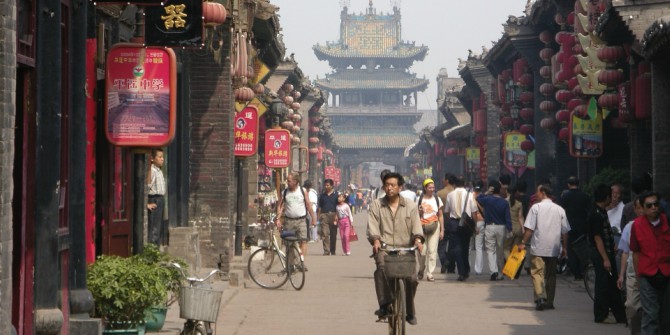
Easy access to foreign markets, unimpeded by tariffs and quotas, is considered to be an important contributor to economic growth and development, particularly for emerging economies. Less well understood is the role of uncertainty in market access (that is, uncertainty about tariffs and quotas that may be applied in the future by trade partners) in driving economic outcomes.
In recent research, we aim to improve our understanding of the implications of trade policy uncertainty by studying an episode featuring a sharp reduction in uncertainty: China joining the World Trade Organisation (WTO) in 2001.
This event is particularly informative because it caused a substantial reduction in uncertainty for Chinese firms looking to access the American market, while keeping the tariffs applied to Chinese exporters by the country’s major trading partners, including the US, unchanged.
The reduction in uncertainty was different across manufacturing sectors. ‘Worst-case scenario’ tariffs, that Chinese exporters would have faced if the favourable trading regime was terminated, varied widely across products. Consequently, sectors that experienced the removal of more severe tariff threats stood to benefit more from WTO membership.
We use the fact that the reduction in uncertainty was different across manufacturing sectors, and the fact that Chinese cities differ in their sectoral specialisation, to develop a city-level measure of the reduction in uncertainty regarding access to the US market.
In effect, our measure treats cities as portfolios of sectors, and assigns each city a reduction in trade uncertainty equal to the weighted average reduction in uncertainty experienced by the city’s sectors. Equipped with this new measure of market access uncertainty at the level of local economies, we proceed to relate improvements in US market access to economic outcomes at the city level after 2001, the year China became a WTO member.
We find that improved trading conditions with the United States brought large economic benefits to Chinese local economies. A city in the top quarter of cities by exposure to reductions in US market access uncertainty grew its population 11 per cent faster between 1998 and 2007 than an otherwise comparable city ranked in the bottom quarter of cities by the same measure of market access improvement. For GDP, a similar comparison reveals that the city that stood to benefit more from US trade uncertainty reduction grew 12 per cent faster, while the corresponding number for employment is 23 per cent.
Our estimates indicate that US trade liberalisation can account for up to half of the population growth and three quarters of the manufacturing employment growth recorded by the average Chinese city between 1998 and 2007. As expected, increased domestic and foreign investments are important contributors to the growth of the most affected cities.
By exploring the channels through which improvements in market access affect local economies, we can make sense of the surprisingly large effects we find. The effect of uncertainty reductions is augmented by the presence of local linkages between sectors that operate both within the wider manufacturing sector, and from manufacturing to non-tradable sectors such as local services, retail, construction etc. In other words, when a particular industry grows as a result of improved access to US markets, other local industries tend to benefit as well.
Manufacturing industries are found to benefit not only from uncertainty reductions affecting their own products, but also from growth in co-located sectors that experience reduced uncertainty, particularly when those sectors employ similar workers. Moreover, growth in the overall tradable sector has a multiplier effect on local non-tradable activities, such as retail, finance and construction. This latter effect is perhaps to be expected, as the growth of the local manufacturing workforce due to trade liberalisation tends to increase demand for goods and services provided locally.
All in all, this research indicates that reducing market access uncertainty can have important trade-creating effects, with material knock-on benefits in terms of growth. But our results should raise additional concerns about recent developments, such as the Brexit vote in the UK and the election of President Trump in the US, which have arguably generated increased uncertainty regarding future international trading arrangements. Our findings show that these events don’t need to produce any actual shifts in policy in order to generate substantial economic costs.
♣♣♣
Notes:
- This blog post is based on the authors’ paper Trade Liberalization and Economic Development: Evidence from China’s WTO Accession, presented at he Royal Economic Society’s annual conference at the University of Bristol in April, 2017.
- The post gives the views of its authors, not the position of LSE Business Review or the London School of Economics.
- Featured image credit: Xian City of Pingyao, by janeb13, under a CC0 licence
- Before commenting, please read our Comment Policy.
 Wenya Cheng is a Lecturer in Economics at the University of Manchester. Her research interests are in development economics, labour economics and international trade.
Wenya Cheng is a Lecturer in Economics at the University of Manchester. Her research interests are in development economics, labour economics and international trade.
 Andrei Potlogea is a Lecturer in Economics at the University of Edinburgh. He obtained his PhD in Economics from the Universitat Pompeu Fabra in Barcelona, Spain. His research focuses on topics in economic geography, urban economics and international trade.
Andrei Potlogea is a Lecturer in Economics at the University of Edinburgh. He obtained his PhD in Economics from the Universitat Pompeu Fabra in Barcelona, Spain. His research focuses on topics in economic geography, urban economics and international trade.
.





